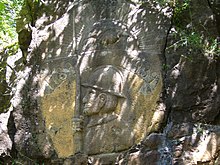Camp de Rieucros
The Rieucros camp was a French concentration and internment camp in the town of Mende in the Lozère department . It consisted of 14 wooden barracks and two stone buildings.
history
The camp was opened by decree of January 21, 1939. It was supposed to serve to intern unwanted foreigners, including German anti-fascists , Spanish republicans and members of the International Brigades . At the beginning of November 1939, all male prisoners were transferred to the Le Vernet d'Ariège internment camp , as the Rieucros camp was to serve as an internment camp for women from now on.
In the autumn of 1939 Spanish women were also housed here, to whom hundreds of German women from the Parisian prison Petite Roquette soon came. In January 1941 there were 453 prisoners in the camp, 39 of them were children aged 14 and under. On February 13, 1942, the camp was closed and the remaining 320 women and 26 children in the camp of Brens near Gaillac in the Tarn transported.
Remains of the camp
Today there are only a few traces of the camp in the Rieucros valley. A sign shows the position, but the barracks have completely disappeared. There are only two stone houses that belonged to the complex and are now privately owned. The main remaining trace is a rock sculpture showing a soldier holding his rifle in his right arm. Below are two dates: 1789 and 1939, symbolizing the 150th anniversary of the French Revolution. A name is engraved nearby: Walter Gierke. This name is also on the list of prisoners and is believed to be the originator of the rock sculpture.
Inmates
Among the prisoners was the writer Michel del Castillo (* 1933), who was interned with his mother. The German mathematician Alexander Grothendieck and his mother stayed here, as well as the Russian writer and anarchist Ida Mett and her son. The Italian anti-fascist Ernesto Bonomini was also interned here, but was able to flee in April 1939. The German actress Steffie Spira-Ruschin , who wrote a few poems about life in the camp during her time in Rieucros, and the Czech writer Lenka Reinerová also managed to escape from the camp. The Swiss photographer and environmentalist Gertrude Duby-Blom was interned in the Rieucros camp for a short time before she was able to leave France with the help of the Swiss embassy. Other known inmates were the anti-fascist Dora Schaul , the costume designer Sylta Busse and the communist and resistance fighter Maria Wachter , who is today honorary chairwoman of the Association of Persecuted Persons of the Nazi Regime - Association of Antifascists (VVN-BdA) in North Rhine-Westphalia, as well as the resistance fighter Clare Quast . The occupational therapist Ursula Pacyna, who later worked in East Berlin, wrote a diary in the camp. Here she also met her husband Alfred Katzenstein .
Memorial association
In 1992 an association was founded with the aim of keeping the memory of the camp and what happened and explaining it to visitors.
literature
- Mechtild Gilzmer: Women's internment camp in southern France. Rieucros and Brens 1939–1944. Orlanda-Frauenverlag, Berlin 1994, ISBN 3-929823-10-1 ( The other view ).
- Mechtild Gilzmer: Camps de Femmes. Chroniques d'internées, Rieucros et Brens, 1939–1944. Éditions Autrement, Paris 2000, ISBN 2-7467-0028-X ( Éditions Autrement - Collection Mémoires 65).
Individual evidence
- ↑ In search of Walter GIERKE
- ↑ Poems from Riecros by Marina Strasde, Steffie Spira, Lenka Reinerová u. a.
- ↑ https://www.cairn.info/camps-de-femmes--9782746700284.htm
- ↑ Article in the French daily Le Midi Libre of July 18, 2007 (French)

